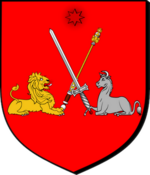Kingdom of Kartli (1484-1762)
| Kingdom of Kartli | ||||||||||
| ქართლის სამეფო | ||||||||||
| Kingdom | ||||||||||
|
||||||||||
|
|
||||||||||
|
Kingdom of Kartli in 1490
|
||||||||||
| Capital | Tbilisi | |||||||||
| Languages | Georgian | |||||||||
| Religion | Georgian Orthodox Church | |||||||||
| Political structure | Kingdom | |||||||||
| King | ||||||||||
| • | 1466–1478 | Bagrat VI of Georgia (first) | ||||||||
| • | 1744–1762 | Teimuraz II (last) | ||||||||
| Historical era | Early modern period | |||||||||
| • | Established | 1466 | ||||||||
| • | Subject of Persia | 1555-1747 | ||||||||
| • | Union of Kartli and Kakheti | 1762 | ||||||||
| • | Disestablished | 1762 | ||||||||
|
||||||||||
| Today part of |
Countries today
|
|||||||||

Coat of Arms according to Prince Vakhushti's Atlas (c.1745)
The Kingdom of Kartli (Georgian: ქართლის სამეფო) was a feudal Georgian state that existed from 1466/84 to 1762, with the city of Tbilisi as its capital. Through much of this period of time the kingdom was a vassal of the Persian empire, but enjoyed intermittent periods of greater independence, especially after 1747.
In the 15th century, after a long economical and political decline, Georgia became neighbors with the increasingly volatile and aggressive Ottoman Empire, and from the 16th century with the Safavid Empire, causing the kingdom to be in a state of almost constant war or ruled by the Persians for the entirety of its three centuries of existence.
Georgia experienced a high degree of civil instability, feudal separatism, and civil wars. The defeat of George VIII in the Battle of Chikhori against rebellious noble Bagrat, who proclaimed himself the King of Imereti, marked the beginning of the final disintegration of united Georgian monarchy and the state. In 1465, George VIII was captured by Kvarkvare II Jaqeli the Atabeg of Samtskhe. Sensing opportunity, Bagrat VI immediately proclaimed himself King of Kartli as well and took control of it in 1466. Kvarkvare, fearing that Bagrat would gain too much power, released George VIII from captivity, but the king was unable to reclaim the crown and only managed to proclaim himself King of Kakheti, creating even more fragmentation.
...
Wikipedia

